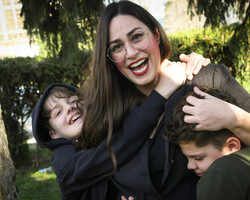Ana Maita, Chairperson of Mothers for Mothers, Bucharest, Romania

WHO/Malin Bring
Ana Maita
Ana Maita is a freelance interpreter and translator, living in Bucharest with her husband and 2 sons. She is also the founder and chairperson of the nongovernmental organization (NGO) Mothers for Mothers, and a passionate spokesperson for vaccines – driven by the story of her polio-damaged father-in-law.
“I’m so happy to be living in a century where we are working for the health of our children. 100 years ago, I would probably have given birth to at least 5 children, and 2 of them would have died from preventable diseases,” she says.
Polio – past but still present
It was the story of her father-in-law that initially made Ana think about the importance of vaccines. He grew up during the first polio vaccination campaign in Romania, as the 6th child in a poor family. At the time, a single doctor would be covering a large rural area, administering oral drops of vaccine to children.
“The mother gathered all 6 children and marched them to the clinic, but when they arrived, the doctor only had 5 doses of the vaccine left. He told her she had to choose 1 child that would have to go without.”
The mother chose her beloved youngest, since the youngest and weakest child was the least likely to survive childhood in a large, poor family.
“Of course, my father-in-law got polio. His foot was deformed, and that leg grew shorter than the other. He has limped his whole life, which has affected him greatly. He is still alive today and living proof of what it means to not protect your child from preventable diseases.”
Mothers for Mothers
In 2010, Ana was pregnant with her first child. In WHO guidelines and other scientific sources, she had read about natural childbirth and having her husband by her side during labour and delivery. However, she soon found out that none of this was available to her. In the Romanian capital, women still gave birth in the traditional, medicated way, with husbands banned from the delivery room.
“I wanted a normal birth, but because of my demands, I was rejected by all the hospitals, including the only private one…. I had never felt discriminated against before, but now, in my most vulnerable time as a woman, I found out that I was. I felt I had to do something about it.”
She wrote down her story and submitted it to one of the most popular women’s magazines, where it went viral. Women started contacting her from all over the country with their experiences. “I used the momentum to put the human rights of women in childbirth on the agenda, by organizing a meeting and founding our NGO, Mothers for Mothers.”
The organization advocates for sound public health policies, human rights in childbirth and health education for children. Vaccination promotion is also very much on the agenda. The NGO is present at all big events concerning children and parents, and often participates in debates with people who do not support vaccination. “We have a tight collaboration with the authorities. They call us when they need somebody to speak up for vaccinations.”
Battle against misinformation
Ana invests 10–12 hours a week on interviews, social media and producing information materials for the organization. Those who she debates on the subject of vaccination, “often have an idealized and misleading understanding of the past, thinking it means effortlessly growing your own food and living a pure and simple life”.
“These views are usually held in very urban, digitalized circles.... But our ancestors lived very difficult lives and worked hard for the food on their tables. They were used to the fact that even the most innocuous disease could kill off half a village.”
One of the aspects that makes the struggle against misinformation about vaccines so difficult, she finds, is that the motivation of parents who are against vaccination is the same as those who are in favour: “They just want what they think is the best for their children, exactly as we do. They are not stupid; many of the parents I meet are very intelligent. They may be lawyers and engineers and have academic degrees, but most of them have no medical or research training”.
Despite the deadly spread of measles in Romania over the last 2 years, Ana explains, “People tend to think that measles is not around any longer, since they don’t personally see many cases of it. We need to remind them about the reality and prioritize the safety of children above all”.
The mission of Mothers for Mothers, in Ana’s view, is not to try to convince people who are strongly opposed to vaccination – “because we can’t”. “The people we want to convince are the parents who are on the fence about vaccination, who still have questions and doubts, and want information. They are the ones who can be helped from turning against sound medical choices that protect their children and everybody's children.”



